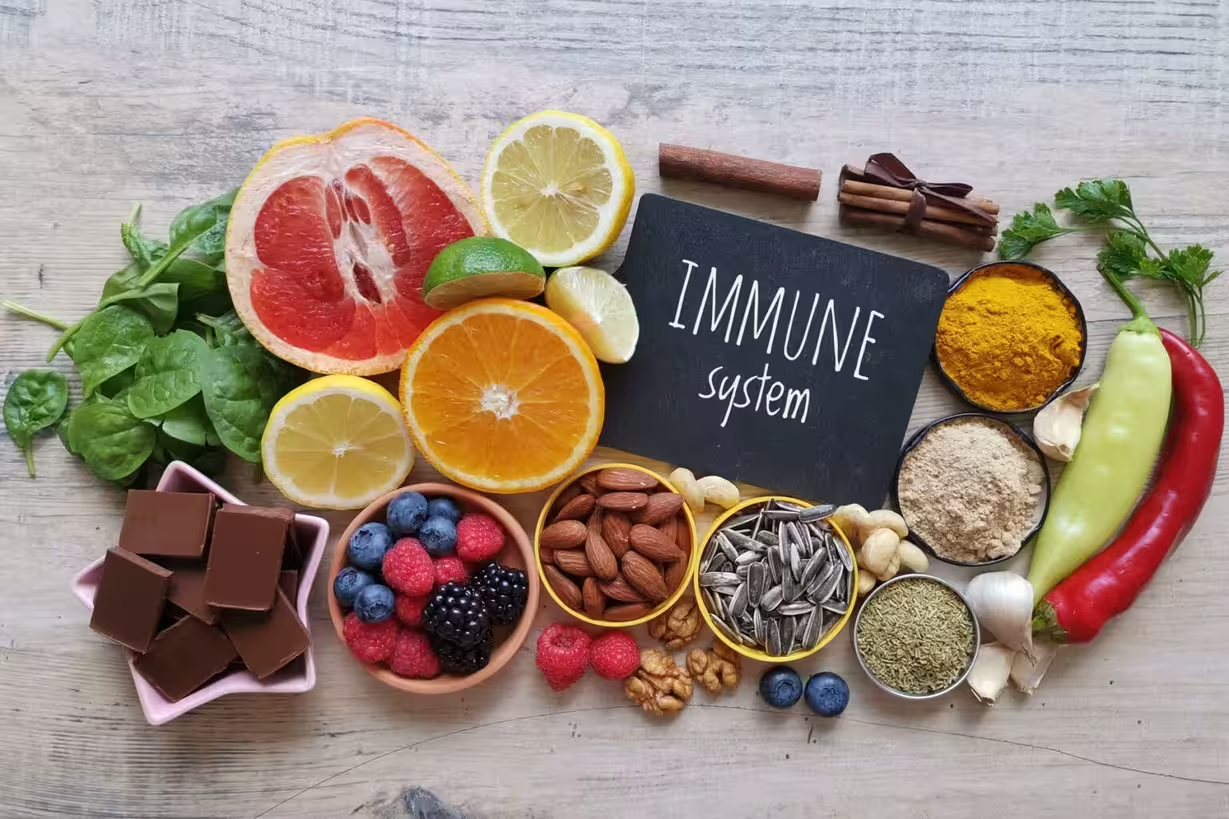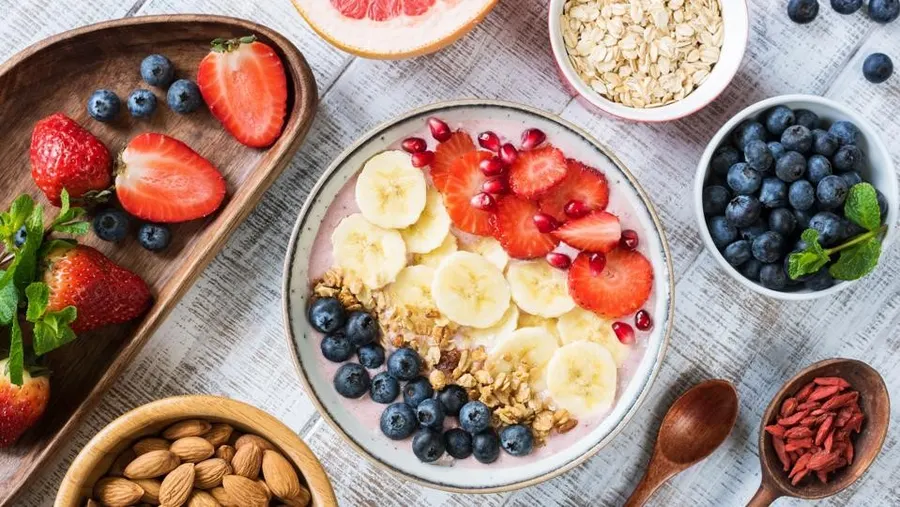In today’s fast-paced world, maintaining a robust immune system is more critical than ever. The global health challenges of recent years have underscored the importance of a well-functioning immune system, and one of the most effective ways to support immunity is through proper nutrition. Food is more than just fuel; it’s a source of essential nutrients that work synergistically to fortify our defenses against illnesses. This article delves deep into how nutrition impacts immunity, the key nutrients involved, and dietary strategies to optimize immune health.
Understanding the Immune System
The immune system is a complex network of cells, tissues, and organs that work together to defend the body against harmful pathogens like viruses, bacteria, and other invaders. Its functions can be broadly divided into two categories:
- Innate Immunity: This is the body’s first line of defense, comprising barriers like the skin, mucous membranes, and immune cells that respond quickly to pathogens.
- Adaptive Immunity: This is a more specialized defense mechanism that involves the production of antibodies and memory cells, enabling the body to recognize and combat pathogens more efficiently during subsequent encounters.
While genetics play a role in immune function, environmental factors, particularly diet, significantly influence the immune system’s strength and responsiveness.
The Connection Between Nutrition and Immunity
The phrase “you are what you eat” holds especially true for immune health. Nutritional deficiencies can impair immune function, while a well-balanced diet can enhance it. Here’s how:
- Building Blocks of Immune Cells: Nutrients like amino acids and fatty acids are essential for the production and functioning of immune cells.
- Antioxidant Protection: Vitamins and phytochemicals neutralize free radicals, reducing oxidative stress that can weaken the immune response.
- Microbiome Support: A healthy gut, enriched by fiber and probiotics, acts as a major hub for immune activity.
- Inflammation Regulation: Certain foods can reduce chronic inflammation, a factor that compromises immunity.
Key Nutrients for Immune Health
1. Vitamin C: The Immunity Superstar
- Role: Vitamin C enhances the production and function of white blood cells, supports skin barriers, and acts as a powerful antioxidant.
- Sources: Citrus fruits, bell peppers, strawberries, broccoli, and kiwis are excellent sources.
2. Vitamin D: The Immunity Modulator
- Role: Vitamin D is crucial for activating immune cells and reducing the risk of respiratory infections.
- Sources: Fatty fish (like salmon and mackerel), fortified dairy products, eggs, and sunlight exposure contribute to vitamin D levels.
3. Zinc: The Cellular Helper
- Role: Zinc supports the growth and function of T-cells, a type of adaptive immune cell.
- Sources: Meat, shellfish, legumes, nuts, and seeds are rich in zinc.
4. Vitamin A: The Infection Fighter
- Role: Vitamin A is essential for maintaining mucosal surfaces, such as the respiratory and intestinal linings, which act as physical barriers against pathogens.
- Sources: Sweet potatoes, carrots, spinach, and liver are high in vitamin A.
5. Iron: The Oxygen Carrier
- Role: Iron aids in the production of hemoglobin, which carries oxygen to immune cells.
- Sources: Red meat, poultry, lentils, tofu, and fortified cereals are excellent sources of iron.
6. Probiotics and Prebiotics: Gut Health Allies
- Role: A healthy gut microbiome strengthens immunity by enhancing the gut barrier and modulating immune cell activity.
- Sources: Yogurt, kefir, kimchi, sauerkraut (probiotics), and foods rich in fiber like bananas, oats, and legumes (prebiotics).
7. Omega-3 Fatty Acids: The Inflammation Reducers
- Role: Omega-3s regulate inflammation and improve communication between immune cells.
- Sources: Fatty fish, flaxseeds, chia seeds, and walnuts are good sources.
The Role of Whole Foods in Immune Support
Focusing on whole, minimally processed foods ensures that your body receives a variety of essential nutrients in their most bioavailable forms. Processed foods often lack the necessary nutrients and can even contribute to inflammation due to high sugar, unhealthy fats, and additives. Here’s how to build a nutrient-dense diet for immunity:
1. Colorful Fruits and Vegetables
- Rich in vitamins, minerals, and antioxidants, these should form the cornerstone of your diet. Aim for a “rainbow” on your plate to maximize nutrient diversity.
2. Lean Proteins
- Proteins are the building blocks of immune cells. Include lean meats, poultry, fish, eggs, legumes, and plant-based protein sources like tofu and tempeh.
3. Healthy Fats
- Incorporate sources of unsaturated fats like olive oil, avocados, and nuts. These fats aid in the absorption of fat-soluble vitamins like A, D, E, and K.
4. Whole Grains
- Whole grains like oats, quinoa, and brown rice provide fiber for gut health and slow-releasing carbohydrates for sustained energy.
5. Hydration
- Staying hydrated is vital for maintaining mucosal barriers and flushing out toxins. Opt for water, herbal teas, and broths over sugary drinks.
Foods to Limit for Optimal Immune Health
While focusing on nutrient-rich foods is essential, it’s equally important to minimize foods that can impair immune function:
- Refined Sugars and Carbohydrates: These can lead to blood sugar spikes and inflammation.
- Excessive Alcohol: Alcohol weakens the immune system by disrupting gut health and impairing white blood cell function.
- Trans Fats: Found in fried and processed foods, trans fats can increase inflammation.
Superfoods, Gut Health, and Meal-Planning Strategies for Optimal Immunity
Building on the foundational knowledge from Part 1, we now delve into practical applications and the role of specific foods in bolstering the immune system. This section highlights superfoods renowned for their immune-supportive properties, the critical connection between gut health and immunity, and meal-planning strategies to integrate these insights into your daily routine.
Superfoods for Immune Support
Certain foods stand out for their extraordinary nutrient profiles and immune-enhancing benefits. Incorporating these “superfoods” into your diet can give your immune system a natural boost.
1. Garlic: The Natural Antibiotic
- Why It Works: Garlic contains allicin, a compound known for its antimicrobial and immune-enhancing properties. Regular consumption can help prevent and reduce the severity of colds and other infections.
- How to Use: Add raw or lightly cooked garlic to soups, stir-fries, and salad dressings for maximum benefits.
2. Ginger: The Anti-Inflammatory Root
- Why It Works: Ginger is rich in bioactive compounds like gingerol, which have anti-inflammatory and antioxidant effects. It may help reduce inflammation and improve immune responses.
- How to Use: Brew ginger tea, add it to smoothies, or include grated ginger in marinades and curries.
3. Citrus Fruits: Vitamin C Powerhouses
- Why It Works: Oranges, lemons, limes, and grapefruits are loaded with vitamin C, which supports white blood cell production and strengthens the skin’s barrier function.
- How to Use: Enjoy fresh citrus fruits, squeeze lemon juice over salads, or make a refreshing citrus-infused water.
4. Berries: Antioxidant-Rich Gems
- Why They Work: Blueberries, strawberries, and blackberries are packed with anthocyanins, antioxidants that help neutralize free radicals and reduce inflammation.
- How to Use: Add berries to oatmeal, yogurt, or smoothies, or snack on them raw.
5. Turmeric: The Golden Spice
- Why It Works: Curcumin, the active compound in turmeric, has potent anti-inflammatory and immune-boosting properties.
- How to Use: Combine turmeric with black pepper (to enhance absorption) in curries, soups, or golden milk lattes.
6. Green Tea: A Polyphenol Powerhouse
- Why It Works: Green tea contains catechins and other polyphenols that have antioxidant and immune-enhancing effects.
- How to Use: Replace sugary beverages with green tea, or enjoy it as a soothing afternoon ritual.
7. Mushrooms: Nature’s Immune Modulators
- Why They Work: Varieties like shiitake, maitake, and reishi are rich in beta-glucans, compounds that enhance immune cell activity.
- How to Use: Sauté mushrooms as a side dish, add them to soups, or incorporate powdered forms into broths.
8. Nuts and Seeds: Small But Mighty
- Why They Work: Almonds, sunflower seeds, and flaxseeds are high in vitamin E, selenium, and omega-3 fatty acids, all of which contribute to immune health.
- How to Use: Sprinkle seeds over salads, enjoy nuts as a snack, or blend them into nut butters.
Gut Health and Immunity: The Vital Connection
The gut is often referred to as the “second brain,” but it could just as easily be called the “immune headquarters.” Approximately 70% of the immune system resides in the gut, where beneficial bacteria play a pivotal role in immune regulation.
How Gut Health Influences Immunity
- Microbiome Diversity: A diverse gut microbiome helps train the immune system to distinguish between harmful and harmless invaders.
- Barrier Integrity: A healthy gut lining prevents pathogens from entering the bloodstream.
- Immune Modulation: Gut bacteria produce short-chain fatty acids (SCFAs), which help regulate immune cell activity and inflammation.
Foods That Support Gut Health
- Probiotics: Found in fermented foods like yogurt, kefir, kimchi, sauerkraut, and miso, probiotics introduce beneficial bacteria to the gut.
- Prebiotics: High-fiber foods like bananas, garlic, onions, and whole grains act as food for gut bacteria, promoting their growth.
- Polyphenols: Foods like green tea, dark chocolate, and berries support a healthy gut microbiome by fostering beneficial bacterial growth.
Tips for Gut-Healthy Eating
- Avoid excessive antibiotics, which can disrupt the gut microbiome.
- Limit processed foods and added sugars, as they promote the growth of harmful bacteria.
- Stay hydrated, as water aids in digestion and supports gut function.
Meal-Planning Strategies for Immune Health
A well-thought-out meal plan can ensure you consistently consume the nutrients your immune system needs. Here’s how to design an immune-boosting meal plan:
1. Start with Breakfast
- Example Meal: Greek yogurt parfait with mixed berries, a drizzle of honey, and a sprinkle of chia seeds.
- Why It Works: This meal combines probiotics, antioxidants, and omega-3 fatty acids.
2. Make Lunch Nutrient-Dense
- Example Meal: Spinach and kale salad with grilled chicken, avocado, orange segments, sunflower seeds, and a turmeric-infused dressing.
- Why It Works: This dish includes vitamins A, C, and E, healthy fats, and anti-inflammatory compounds.
3. Snack Smartly
- Example Snack: A handful of almonds and a green tea.
- Why It Works: This combination provides vitamin E, polyphenols, and antioxidants.
4. End with a Balanced Dinner
- Example Meal: Baked salmon with quinoa, steamed broccoli, and a side of roasted garlic.
- Why It Works: This meal delivers omega-3s, fiber, and immune-supportive vitamins like C and D.
5. Stay Hydrated
- Incorporate herbal teas, infused water, and broths throughout the day to stay hydrated and support the immune system.
Common Pitfalls and How to Avoid Them
- Overemphasizing One Nutrient: While vitamin C and zinc are important, focusing on a single nutrient can lead to deficiencies in others.
- Skipping Meals: Consistent nutrient intake is vital for sustaining immune function.
- Relying on Supplements Alone: While supplements can be helpful, whole foods provide synergistic benefits that pills cannot replicate.
Debunking Common Nutrition and Immunity Myths
1. Myth: “Taking a megadose of vitamin C will prevent colds.”
- Reality: While vitamin C plays a vital role in immune health, taking excessive amounts does not guarantee prevention of illnesses. Studies show that regular vitamin C intake can slightly reduce the duration and severity of colds but does not prevent them entirely. Balance is key; excessive vitamin C can lead to side effects like stomach discomfort.
2. Myth: “Avoiding all fats is good for your immune system.”
- Reality: Healthy fats, particularly omega-3 fatty acids, are crucial for immune function. They help regulate inflammation and improve cell membrane integrity. Avoiding trans fats and focusing on sources like fish, nuts, and seeds is more beneficial than eliminating fats altogether.
3. Myth: “Supplements are a substitute for a healthy diet.”
- Reality: Supplements can fill gaps in nutrition but cannot replicate the complex interactions of nutrients found in whole foods. For example, an orange provides not only vitamin C but also fiber, flavonoids, and other bioactive compounds that work synergistically to enhance immunity.
4. Myth: “Detox diets boost immunity.”
- Reality: The body has its own detoxification systems—primarily the liver and kidneys—that effectively eliminate toxins. There is no scientific evidence supporting the claim that detox diets or cleanses significantly enhance immune function.
The Latest Research in Nutrition and Immunity
1. The Role of Phytochemicals
Emerging research highlights the importance of phytochemicals—plant-derived compounds like flavonoids, carotenoids, and polyphenols. These compounds are found in colorful fruits and vegetables and have been shown to modulate immune cell function and reduce inflammation.
A study published in Nutrients (2022) found that a diet rich in polyphenols from foods like berries, green tea, and dark chocolate was associated with improved immune response and reduced risk of chronic inflammatory diseases.
2. Personalized Nutrition for Immunity
Recent advancements in nutrigenomics, the study of how genes interact with diet, suggest that personalized nutrition can optimize immune health. For instance, individuals with specific genetic variants may benefit more from higher doses of vitamin D or omega-3 fatty acids. Personalized nutrition plans based on genetic testing are gaining traction as a tool for enhancing immune resilience.
3. Gut-Immune Axis Research
The gut microbiome continues to be a focus of immune research. Studies have linked certain strains of probiotics, such as Lactobacillus and Bifidobacterium, to enhanced immune responses and reduced incidence of respiratory infections. Advances in microbiome research may soon lead to tailored probiotic therapies for immunity.
4. Intermittent Fasting and Immune Health
Intermittent fasting (IF) has been shown to have immune-modulating effects. Research indicates that short-term fasting can improve immune cell regeneration, reduce inflammation, and enhance the body’s response to infections. However, the long-term effects of IF on immunity require further investigation.
Long-Term Strategies for Immune Health
Maintaining immune health is not about quick fixes; it requires sustained lifestyle changes. Here’s how to adopt long-term strategies:
1. Adopt a Balanced Diet as a Lifestyle
- Aim for a diet rich in whole foods, emphasizing fruits, vegetables, lean proteins, whole grains, and healthy fats.
- Limit ultra-processed foods, sugary beverages, and excessive alcohol.
2. Focus on Lifestyle Habits
- Exercise: Regular physical activity improves circulation, reduces inflammation, and boosts immune cell function.
- Sleep: Aim for 7–9 hours of quality sleep per night. Sleep deprivation impairs immune responses and increases susceptibility to infections.
- Stress Management: Chronic stress elevates cortisol levels, which can suppress immune function. Practices like mindfulness, meditation, and yoga can help mitigate stress.
3. Stay Hydrated
- Adequate hydration supports all bodily functions, including those of the immune system. Aim for 8–10 cups of water daily, adjusting for activity levels and climate.
4. Seasonal Adjustments
- During colder months, when respiratory infections are more common, focus on foods rich in vitamin C, zinc, and probiotics. In summer, hydrate with water-rich fruits like watermelon and cucumber.
5. Monitor Micronutrient Intake
- Regularly assess your diet to ensure you’re meeting recommended dietary allowances (RDAs) for key immune-supportive nutrients. If needed, consult a healthcare provider about supplementation.
Practical Tips for Implementation
1. Plan Ahead
- Prepare weekly meal plans that incorporate a variety of immune-boosting foods. Batch-cooking and meal prepping can save time and ensure consistency.
2. Involve the Family
- Encourage family members to participate in cooking and meal selection. This fosters healthy eating habits and makes dietary changes sustainable.
3. Keep it Simple
- Focus on one or two changes at a time, such as adding a daily serving of leafy greens or switching from sugary drinks to herbal tea.
4. Stay Educated
- Follow reputable sources for the latest research on nutrition and immunity. Avoid fad diets or unverified health claims.
Looking Ahead
As scientific understanding of the interplay between nutrition and immunity grows, new strategies and insights will continue to emerge. Personalized nutrition, gut microbiome research, and advancements in functional foods are promising areas that may revolutionize how we approach immune health in the future.
Conclusion
Immune health is the cornerstone of overall well-being, and nutrition plays an irreplaceable role in maintaining and enhancing it. By combining a balanced diet with healthy lifestyle habits, you can build a resilient immune system that protects you throughout life’s challenges.
Remember, there’s no magic pill for immunity—but a long-term commitment to eating well and living healthily can make all the difference. With thoughtful planning and a proactive approach, you can empower your body to defend itself and thrive.




